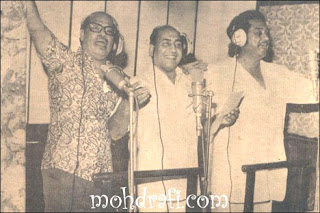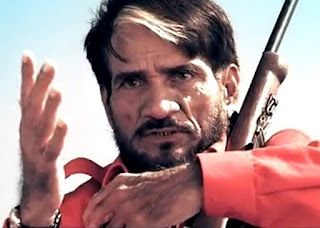Manna De,born on 1st May 1929 was highly inspired and influenced by his Uncle K C Dey the legendary Singer of the late 30s and 40s.He began taking music lessons from Krishna Chandra Dey and Ustad Dabir Khan. During this period, he stood first for three consecutive years in three different categories of inter-collegiate singing competitions.
At the age of 22 years he started working as an assistant music director first under Krishna Chandra Dey, and then under Sachin Dev Burman. Later, he assisted other music composers and then started to work independently. Dey started his career in playback singing with the movie Tamanna, in 1942. The musical score was by Krishna Chandra Dey and Manna De sang a duet named "Jago Aayee Usha Ponchi Boley Jago" with Suraiya which was an instant hit.
It was only in 1943 that he got his first solo break with Ram Rajya. Incidentally, the producer of the film Vijay Bhatt and its composer Shankar Rao Vyas had approached K C Dey with an offer for playback in the film. When K C Dey refused the offer on the grounds that he would not lend his voice to other actors, they spotted Manna Dey sitting in the corner of the room and offered him the opportunity.
After that Manna Dey gave many hit songs.His songs like "O Prem Diwani Sambhal Ke Chalna" from 1944 film Kadambari composed by Anil Biswas, "Dil Churaney Ki Liye from Dur Chaley" (1946) composed by Jafar Khurshid, his duets with Amira Bahee like "E Diniya Jara Suney" from Kamala (1946) and duet song "Aaj Bor Aayee" with Meena Kapoor from 1947 film Chaltey Chaltey became chartbusters in respective years. Between 1945-47 many Manna Dey-Rajkumari duets like "Hay Gagan Me Badal Tharey" in 1945 for the film Vikaramaditya, "Aowji Morey" from Insaaf (1946), all 4 duets from the
film Geet Govind composed by Pandit Indra - "Kit Ho Nando Kumar", "Chorr Sakhi Aaj Laj", "Apney Hi Rang", "Lalit Labang Lata" from Geet Govind became popular.
Manna Dey was a very versatile singer and there was no playback singer who could imitate Manna Dey's versatility. The great Mohammed Rafi once commented that though people listen to his songs, he himself hears only Manna Dey's songs.He established his versatility between 1948 to 1954 by singing not only the classical based film songs but also singing such film songs which were fusion of Indian classical music and pop music and by giving classical music concerts. His experimentation with western music too produced many unforgettable melodies resulting in an increase in singing offers in films from 1955. He began singing ghazalsin Hindi films from 1953. He became a music composer in Hindi films when he composed music along with Khemchand Prakash for both Shri Ganesh Janma (1951) and Vishwamitra (1952).
He got associated with S D Burman with the film named "Mashaal" in which he sang a solo track named "Upar Gagan Vishal", which was another hit. S.D. Burman composed the music for this track.Later he gave many immortal songs with him.One of them was Poochho na kaise maine rain bitaayi from Meri Surat Teri AankhenIt was an irony that he was typed for classical songs,background songs and sons for comedians specially Mehmood. His deep classical training could have been the reason for this anomaly
His first duet with the then upcoming singer Lata Mangeshkar was "Lapat Ke Pot Pahaney Bikral" composed by Vasant Desai for Narsingh Avtar (1949), With Lata Mangeshkar, Manna recorded around 103 Hindi duets of which songs like "Tere Bina Aag Yeh Chandni" from Awara, "Yeh raat bhigi bhigi" and "Aaja Sanam Madhur Chandni Mein" from Chori Chori, "Pyar hua iqrar hua" from Shree 420, "Woh Chand Muskaye" from Akhri Dao (1958), "Ritu aye", "Dil Ki Girah Khol Do" from Raat Aur Din (1966), "Aya Abdulla Aya" from Juaari (1968), "Soch Ke Ye Gagan Jhume" from the flop film Jyoti (1969) and "main buddho lambo lambo" of Buddha Mil Gaya (1971) are still extremely popular. and with Kishore Kumar it was "Subaho Ki Paheli Kiran" from 1951 film Anadolan composed by Pannalal Ghosh. They sang together 6 songs till 1968 but the demand increased after 1972.Their popular songs were "Mere Pyale Mein" from Aamir Garib (1974), "Is Ishq Mein Har" from Mr. Romeo (1974), "Yeh Dosti" from Sholay (1975), "Duniya Me Jeeney" from Naukri, "Kamal Hain" from Karz, "Phool Chaahiye Na" from Pyas (1982) and their last duet was in 1986 film Maqqar - "Tu Hi Mera Sapna". Salil Chowdhry compositions rendered by Dey from films like Ananad and Anadatta became popular as well. Also the trio of Rafi-Kishore-Manna Dey sang together hits like "Tujhme Ishwar, Allah Tujhme" from Nanha Farishta (1969) and "Band Mutthee" from Chalti Ka Naam Zindagi (1981). Kishore-Manna Dey together also sang with Asha in many films and famous among them are "Khan Chacha" from Dil Deewana(1974), "Aa Kitni Sundar Jagah" from Chandi Sona, both composed by R.D. Burman and with Lata in "Goyakechu Nanche" from Manoranjan (1974), "Logo Ke Juban Me Apna" from Nehla Pe Dehla, both composed by Pancham. His first duet with Geeta Roy (Dutt) was "Dhonyo Dhonyo He Ayodh Puri" from the film Ram Vivah (1949) composed by Shankar Rao Vyas, first duet with Umadevi (Tun Tun) was "Hay Ye Hain" from Jangal Ka Jaanwar (1951) composed by Ghantshala. His first duet with the then struggling singer Asha Bhosle was "O Raat Gayee Fir Din Aya" from 1953 film Bootpolish.
Three Legends Manna Dey,Rafi and Kishore
His association with Shankar-Jaikishan and producer Raj Kapoor had begun while working for Awara, but their combination became famous while working together for Boot Polish in 1954. The trio worked in many films together from 1954-1971 whose musical scores were appreciated, irrespective of their box-office fate, like Shree 420, Chori Chori, Mera Naam Joker, Parvarish, Dil Hi to hai, Awara, Sriman Satyavadi, Kal Aaj aur Kaal, Abdullah etc.. The Raj Kapoor- Manna Dey combination produced super hits. Manna Dey gave playback for Raj Kapoor in Shree 420 (Mud Mud Ke Na Dekh), Chori Chori (Yeh Raat Bheegi, Jahan Main Jati and Aja Sanam), Parvarish (Masti bhara hai sama), Dil Hi To Hai (Laga chunari mein daag), Mera Naam Joker (Ae bhai zara dekh ke chalo) and "Ek Paon Chal Raha Hai" from Kal Aaj Aur Kal (1971).
R D Burman also gave many hit songs with Manna Dey specially "chunri sambhal gori udi chali jaye" from Baharon Ke Sapne. Rahul Dev Burman made Manna Dey sing the westernised songs – "Aao Twist Karen" and "Pyar Karta Ja" which became chart busters in 1965.
Manna Dey recorded popular duets with Mohd. Rafi, Dey sang 101 Hindi songs along-with Rafi which include "Ishq Ishq" (Barsaat Ki Raat) "Tu hai mera prem Devta" (Kalpana), "Mama o mama" (Parvarish), Duniyaan ke liye from Maan Gaye Ustaad (1981), "Main Hoon Tera Prem Aur Tu Ho Meri Pran" from Rahu Ketu (1979), the song "Hindustan Ki Kasam" from Hindustan Ki Kasam (1973), "Hum To Tere Hai Deewane" from Johar Mehmood in Hong Kong, "Badey Miya Diwane" from Shagird, "Ye Do Diwane Dil Ke" from Johar Mehmood in Goa, "Agar Dil Dil Se" from Shola Aur Shabnam(1961).
Some of his greatest songs are non-filmi. He recorded selections from Harivanshrai Bachchan’s Madhushala and his songs such as Nathni se toota moti re and Yeh awaara se din has loyal fans.He sang in many languages like in Bhojpuri, Magadhi, Maithili, Punjabi, Assamese, Odia, Konkani, Sindhi, Gujarati, Marathi, Kannada, Malayalam, and Nepali.
Since 1992, Dey withdrew himself from Hindi film music. But he continued to sing in Bengali movies, bhajans and gazals in different languages and appeared in live performances during 1992 to 2012 . His last live performance was in 2012 in Mumbai. His last recorded song in Hindi films was for the film Umar in 2006 composed by Shamir Tandon, Duniyawaalo Kee Nahee Kuchh Bhee Khabar, which he sang along with Kavita Krishnamoorthy and Sonu Nigam. He was presented the Filmfare Life Time Achievement Award in 2011.
He died of a cardiac arrest at 3:45 pm on 24 October at Narayana Hrudayalaya hospital in Bengaluru, aged 94.
Some of the Most Popular Sons of Manna Dey
Song from Mashaal 1950
Song from Do Bigha Zamin (1953)
Song from Shree 420 (1954)
Song from Chori Chori, (1956)
Song from Basant Bahar (1956),
Song from Parwarish, (1958)
Song from Navrang 1959
Song from Kabuliwala 1961
Song from Baat Ek Raat Ki (1962)
Song from Meri Surat Teri Aankhen 1963
Song from Upkar 1967
Song from Padosan (1968)
Song from Mere Huzoor (1968)
Song from Mera Naam Joker (1970)
Song from Zanjeer (1973)
Song from Awishkar 1973
Song from Sholay 1975
.












